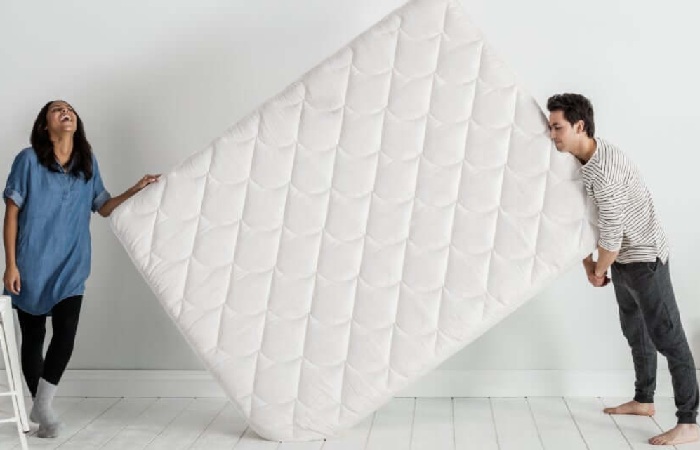Perfect Mattress: As a college student, you face numerous challenges: keeping up with your studies, maintaining a social life, juggling extracurricular activities, and not to mention, learning to live independently. Amidst all these tasks, one aspect that often gets overlooked is the importance of quality sleep. The bed you sleep on plays a significant role in ensuring a good night’s rest, thereby directly impacting your academic performance and overall well-being. This guide aims to help you choose the perfect mattress that will support your journey through college life.
Table of Contents
1. Importance of a Good Sleep
Before we delve into the specifics of choosing a mattress, let’s first understand why a good sleep is so crucial. Numerous studies have linked quality sleep to stronger academic performance. Sleep deprivation can lead to lower grades, compromised learning, and other negative physical and cognitive effects. So, investing in a comfortable and supportive sleep surface is not just a matter of comfort, but a necessity for success in the classroom.
KEY TAKEAWAY: Quality sleep is essential for optimal academic performance and overall well-being.
2. Mattress Size: Choose What Fits

The size of your mattress is one of the first things to consider. While dorm rooms vary in size, a twin bed is typically the standard for those living on campus. Some dorm rooms use extra-long bed frames or box springs to accommodate taller students.
If your student is headed to an off-campus house or apartment, a larger mattress might be in order as space permits. Here’s a quick rundown on mattress sizes:
- Twin size: Ideal for children and smaller adults. Dimensions: 39 inches wide by 75 inches long.
- Twin XL: Same width as a twin but longer, providing more legroom. Dimensions: 39 inches wide by 80 inches long.
- Full size: Good for couples or single adults who need more space. Dimensions: 54 inches wide by 75 inches long.
KEY TAKEAWAY: The size of the mattress you choose should fit the bed frame and the available space in the room.

3. Mattress Types: Pick the Right Material
The material of your mattress can significantly impact its comfort level and durability. Let’s explore some common mattress types that are suitable for college students:
- Spring/Coil: These mattresses use springs or coils for support and have a comfort layer on top. They are responsive, bouncy, and tend to be more supportive and long-lasting.
- Memory Foam: These mattresses respond to body heat and pressure, contouring to your body shape. They offer excellent pressure relief but can retain heat.
- Gel Memory Foam: These are memory foam mattresses with special gel beads injected into the foam. This makes the mattress more conductive, allowing your body heat to transmit through the foam instead of being trapped, making the bed cooler.
- Latex Foam: Made from the sap of the rubber tree, latex mattresses are naturally sourced and offer a unique feel. They are a high-end option and provide excellent durability.
- Air Mattresses: These are inflatable mattresses that can be adjusted for firmness. While they’re portable and convenient, they typically lack the support and durability of traditional mattresses.
- Polyurethane Foam: This is a common material used in many mattresses. These mattresses can offer a good balance of comfort and support at a reasonable price.
KEY TAKEAWAY: The material of your mattress can significantly impact its comfort, support, and temperature regulation.
4. Sleeping Position: Align with Comfort
Your sleeping position can determine the type of mattress that will be most comfortable for you. Here’s a quick guide:
- Side Sleepers: If you sleep on your side, you’ll probably want a softer mattress that can bend to the curves of your hips and shoulders. This will ensure proper spinal alignment and reduce pressure points.
- Back or Stomach Sleepers: If you sleep on your back or stomach, a firmer mattress will be more suitable. It will support the heavier areas of your body, preventing them from sinking into the bed and causing spinal misalignment.
KEY TAKEAWAY: Your sleeping position plays a significant role in determining the ideal firmness of your mattress.
5. Body Weight: Factor in the Pressure
Your body weight can directly influence how firm or soft a mattress feels to you. Here’s a general guide:
- Lightweight (100-180 pounds): If you’re a lightweight sleeper, most mattresses will feel quite firm to you. You might want to look for softer beds, especially if you sleep on your side.
- Average to Heavyweight (180-280 pounds+): If you’re a heavier sleeper, most beds are going to feel on the softer side, because you’re going to sink down into the mattress more. You might want to look for a firm mattress, especially if you sleep on your back.
KEY TAKEAWAY: Your body weight can affect how firm or soft a mattress feels to you.
6. Bed Frame: Do You Need One?
Most dorm rooms come with a bed frame, but some don’t. If you need a bed frame, there are few different options you can choose. You can go for a traditional steel bed frame and box spring, a platform bed, or a headboard and footboard slat bed.
KEY TAKEAWAY: Check with your dorm or apartment management to understand what’s provided and what you need to bring.
7. Mattress Protection: Safeguard Your Investment
Most mattresses don’t come with machine-washable covers, unfortunately. If you’re concerned about stains or spills, we recommend getting a mattress protector to keep your mattress brand new underneath. This will also protect against extra wear and tear, prolonging the life of your mattress and protecting your warranty.
KEY TAKEAWAY: A mattress protector can help prolong the life of your mattress and protect it from stains and spills.
8. Know Your Budget: Affordable Doesn’t Mean Low Quality
College is an exciting time, but it can also be a financially challenging period. Luckily, there are plenty of affordable mattress options available that don’t compromise on quality. Do your research, compare prices, and choose a mattress that fits your budget while still meeting your specific sleep needs.
KEY TAKEAWAY: You don’t have to break the bank to find a quality mattress that suits your needs.
9. Trial Period and Warranty: Read the Fine Print
Before making your purchase, make sure to check if the mattress comes with a trial period and what the warranty covers. A trial period allows you to test out the mattress for a specified period (usually around 100 nights), and if you’re not completely satisfied, you can return it for a full refund. The warranty covers any manufacturing defects or issues that arise during the warranty period.
KEY TAKEAWAY: Always check for a trial period and warranty before purchasing a mattress.
10. Delivery and Set-Up: Plan Ahead
Most mattress companies offer free shipping, and some even offer white-glove delivery and set-up. If you’re moving into a dorm or apartment, consider the logistics of mattress delivery and set-up. Some companies also offer mattress removal services, which can be handy if you’re replacing an old mattress.
KEY TAKEAWAY: Consider the logistics of mattress delivery and set-up when making your purchase.
In conclusion, choosing the right mattress for college can significantly impact your quality of sleep, and consequently, your academic performance. By considering factors like mattress size, material, your sleeping position, body weight, and budget, you can find the perfect mattress that will support you throughout your college years.

